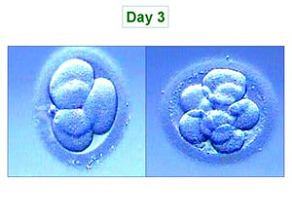Preimplantation Genetic Diagnosis (PGD)
 |
Repeated pregnancy loss is frequently due to genetic problems. This is a difficult and emotionally draining experience. However, there are solutions and treatment options that can help you, including Preimplantation Genetic Diagnosis (PGD).
PGD involves the genetic investigation of early stage embryos, which have been produced through in-vitro fertilization (IVF). PGD allows the Doctor to determine the sex of any given embryo (female or male) and its chromosomal make-up (whether the embryo is chromosomally normal, or, for example, has Downs Syndrome). |
In more complicated testing procedures, it is possible to find out if embryos are affected by such diseases as Tay-Sachs disease, Cystic Fibrosis and Sickle Cell disease, as well as many other genetically inherited diseases.
PGD is widely used in Gender Selection with a more than 99% accuracy rate.
PGD – How is it done?
Embryos created in an IVF cycle are cultured in the laboratory for 3 days when they will have developed approximately 6 to 8 cells. Embryos with normal development on Day 3 will have one or two cells removed for testing. This is performed by placing the embryo under a powerful microscope and using a Laser to make a small cut in the zona pellucida, (a tough outer membrane holding the embryo together). Depending on the health and size of the embryo, one or two cells are taken out. The cut then snaps shut so no cells can fall out accidentally.
PGD is safe and reliable?
There is no reliable evidence that PGD leads to an increase in birth defects or chromosomal disorders. PGD is done before the embryo’s genetic material becomes ‘active’ when the cells inside the embryo are still all identical and each cell is still capable of becoming any part of a baby. Removal of two cells from the early embryo does not alter the ability of that embryo to develop into a complete, normal pregnancy.
PGD for Recurrent Miscarriage
As the risk of miscarriage after two previous consecutive miscarriages is around 29 percent the use of PGD in identifying causes is extremely valuable. A very high percentage of pregnancy losses occur because of genetic or chromosome abnormalities occurring in the embryos. A woman can have predisposing factors that cause her to produce genetically abnormal embryos at a higher rate than other women, even though she has a normal chromosome analysis herself.
Preimplantation genetic screening for aneuploidy (chromosome number) can avoid most abnormalities due to missing or extra chromosomes.
If you have experienced multiple pregnancy losses for unknown reasons you may wish to also consider PGD screening of your embryos as genetically normal embryos have a very high chance of making a pregnancy. The option of PGD for this purpose can be discussed with Cathie or the Doctor, prior to you coming to Thailand.